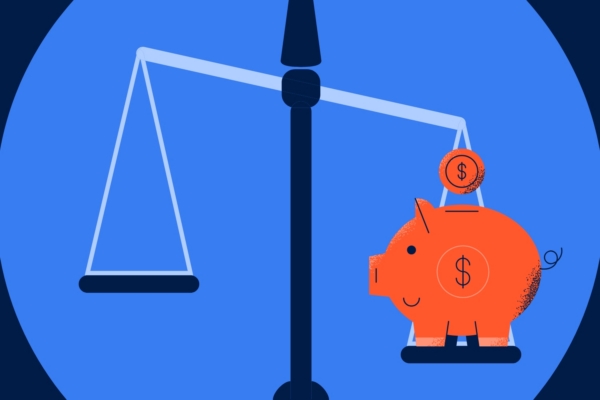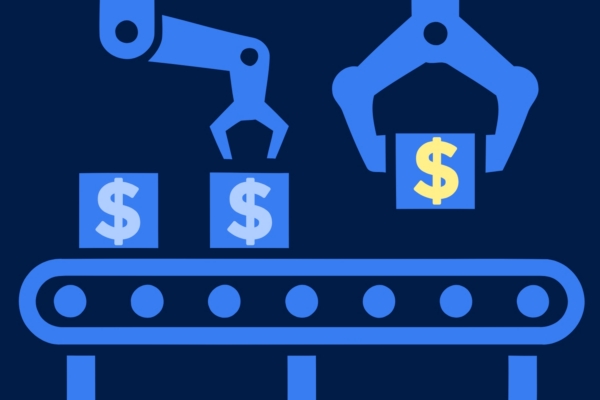
What to Look for in a Certificate of Deposit

Few things can make your heart drop faster than seeing the value of your hard-earned investments plummet with the market. If you’ve experienced a recession before, you may be wondering what you can do to protect your assets in a volatile environment.
One option: a certificate of deposit, or CD. This type of deposit account can be a great place to park your money to combat volatility in an uncertain economy. Although there’s a smaller opportunity for growth compared to other investment options like the stock market, CDs have a guaranteed rate of return.
You’ll find CDs at most credit unions and banks, but interest rates and terms can vary widely. When dealing with certificates of deposit, it’s important to know what to look for in order to maximize your earnings.
What is a certificate of deposit?
Before we dive into what you should look for in a CD, let’s talk a little more about what this financial product is.
A certificate of deposit is a financial instrument that provides a fixed interest premium. Customers must leave their funds in the CD for a predetermined amount of time. This type of account is widely available, meaning that you can probably find them just about anywhere you can get a checking account.
It’s among the safest investment instruments out there for several reasons:
- They are insured by the government: Much like checking and savings accounts, CDs can be FDIC or NCUA insured up to $250,000. If it is insured and your bank or credit union closes, your investment is protected. Keep in mind that not all CDs are insured.
- The interest rate is guaranteed: Even if the market crashes, your investment value won’t go down and your interest rate won’t fluctuate.
That said, CDs have a smaller growth potential than investments like stocks. They are also less liquid, meaning you may face penalties if you need to access your money. However, in an uncertain economy, these tradeoffs are often a welcomed alternative as opposed to keeping your savings in a non-interest earning account.
CDs can have some flexibility if you create a “CD ladder”. This involves investing in several CDs with staggered maturities. By diversifying the age of your CDs, you can give yourself access to funds in the short term while also taking advantage of the higher interest rates of long-term CDs.
Start Earning Today
If you’re ready to regain a little savings confidence, then use the link below to open a high-yield certificate of deposit with Amplify Credit Union.
What You Should Look for in a Certificate of Deposit (CD)
Here’s a breakdown of what you should look for before putting your money in a certificate of deposit.
1. Is the CD easy to open?
First thing first— what is the process for opening a CD like?
You don’t want to have to jump through hoops just to open a new account and put your money someplace safe. Putting your money in a CD should be easy.
At Amplify, we’ve made our process as simple as possible. You can open your account online or in person at one of our branch locations.
2. What is the interest rate?
Interest rates on CDs can vary widely from bank to bank, which is why it is important to shop around.
Current national averages sit at 0.31% APY for 1-year CDs, 0.47% for 3-year CDs, and 0.57% for 5-year CDs.
Amplify is currently offering limited-time CD rates of 2.48% APY for a two-year term, and 2.6% APY for a three-year term.
3. Does the CD term length meet your needs?
To make the most of your CD, you should leave your money untouched for the duration of its term. Terms typically range from a few months to five years. Short-term (less than a year) CDs typically have poor returns. Long-term CDs (5+ years) usually have the best returns.
When choosing a CD, consider when you’ll need to access your funds. Can you afford to keep that money tucked away for more than five years, or do you anticipate needing it before then?
Our newest CDs have rates that you would typically see with five-year CDs, but with much shorter terms. We designed these with our current economy in mind: these CDs have higher rates and lower terms, so you can ride the next few years out with your savings intact.
4. Is the certificate of deposit NCUA or FDIC insured?
It’s important to note that you only get the protection of the Federal Deposit Insurance Corporation (FDIC) or National Credit Union Administration (NCUA) if you open your account with their member organizations.
Most deposit accounts at banks and credit unions in the United States are insured. CDs purchased through foreign banks, U.S. branches of foreign banks, or a brokerage may not have this benefit. Uninsured CDs often have higher interest rates, but you risk losing your money if the institution fails. Before opening a CD, check that it is insured by either the NCUA or FDIC.
5. Will you be charged fees?
Depending on the institution that you open your CD with, you may be charged fees for things like early withdrawal.
Like our checking and savings accounts, CDs at Amplify are fee-free! This means you can invest without worrying about how bank fees are eating into your earnings.
Ready to invest in a CD?
Ready to open a CD? Start by comparing your options. At Amplify, you can open a certificate of deposit with as little as $500 or as much as $250,000. Our CDs are always fee-free and backed by the NCUA.
Whether you’re looking to protect your assets against economic turmoil or are simply looking for a better place to park your hard-earned savings, a CD may be a good option for you.
Get Started with Amplify
Every Amplify account holder enjoys fee-free banking. That means no overdraft, maintenance, or other banking fees cutting into your pocket.




